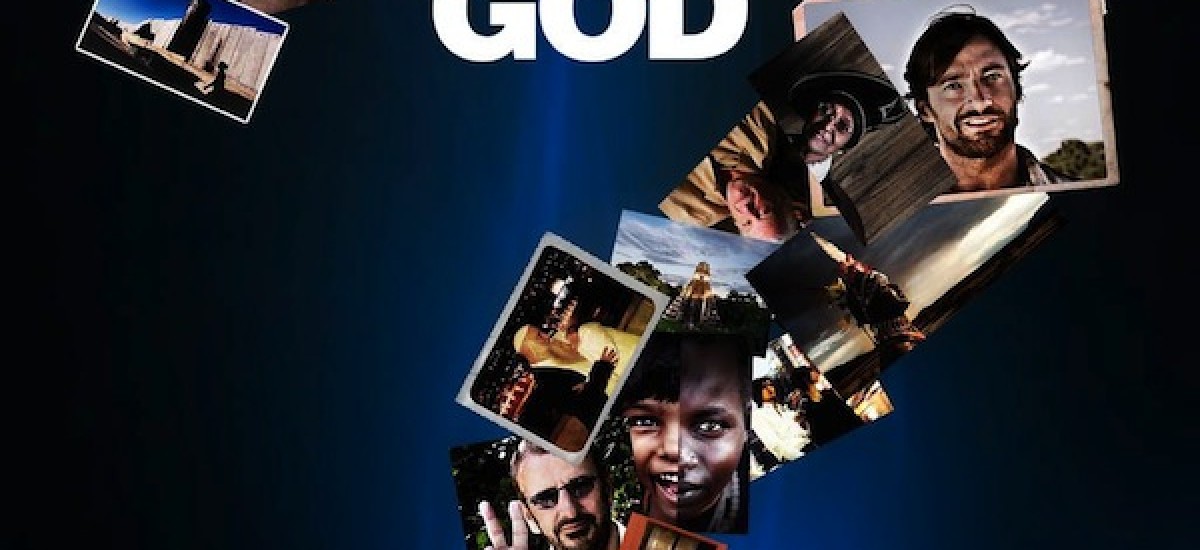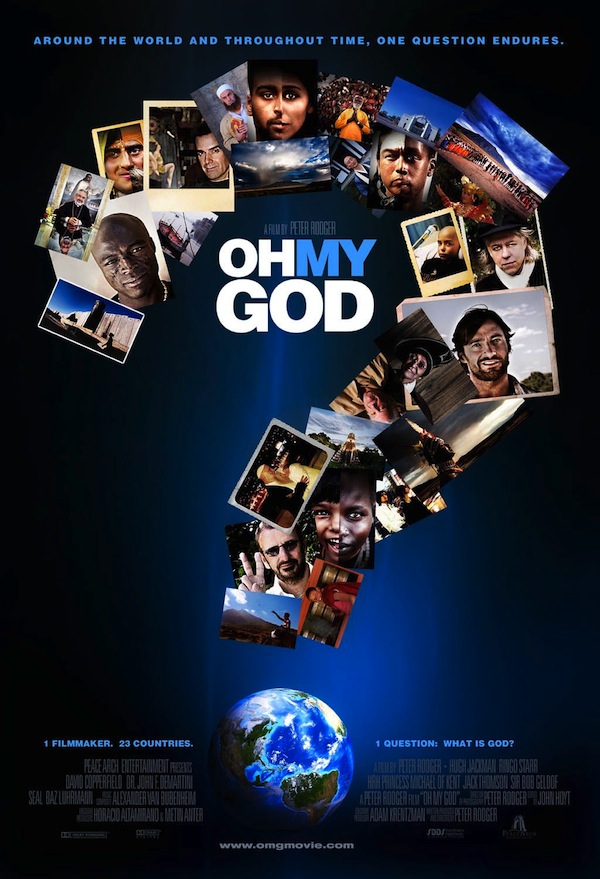Poster for the film Oh My God
I was born into a Malay family, where religion never seemed to play an important role. Most of the women in my family hardly covered their heads and the men usually consumed alcohol at every family gathering. There were a few who were staunch believers and prayed five times a day; some of them even covered their heads. But this was a rare instance and most often, it was looked upon as an act of extremism.
Growing up, religion was never imposed on me. Unlike most Muslim children I knew at the time, my parents never forced me to pray, never pressured me to cover or refrained me from doing things that were usually frowned upon in Islam. They did, however, teach me some aspects of Islam. I was taught the Kalimas, the six articles of Islamic faith, the stories of Prophet Muhammad, of Adam and Eve, and of Jesus. I was taught to be scared of the fiery depths of hell, to be aware of the wrongful path of non-believers and to believe that they were all doomed to Hell. I was told to not have doubts about God, to not question his will because it was a sin to do so.
At the age of 14, I transferred from a government school to an all-girls private Muslim school, where I was exposed to stringent Islamic beliefs. I was taught how to read and write Arabic, how to recite the Holy Quran and how to pray and worship God. I saw that teachers were using fear as a technique to help children stay away from what was deemed evil. I learned that the things I thought were acceptable were no longer right, yet I still watched movies, listened to music, and celebrated birthdays. I still drew figures with eyes, and collected photos for family albums. I experienced the stigma of being a “Modern Muslim”, a “Hypocrite”, a “Malay” in the midst of those who followed the words of the Quran. I listened to the stories of my friends, stories that echoed their difficulties in having heart-to-heart conversations with their parents or their inability to go out without adult supervision. I felt their resignation to their already-planned future and I remember the ominous sound of their acceptance ringing in my ears. I heard of the 14-year old girl who got engaged, about the 18-year old who got married, about the 20-year old who already had two children. Throughout all this, I hardly prayed, yet I still believed.
It became clear that there were two types of Islam being practiced. One considered to be the right path by the majority, the religious and the pious – those who stayed away from alcohol, who prayed five times a day and who covered – yet were victims of basic human errors, of lying, of slander, of selfishness and of greed. The other were moderate followers, who believed in the same – in God, in Heaven and Hell, in the Prophets, in marriage to your own kind – yet rarely covered, or prayed, or abstained from temptations. I saw the pious looking down upon the moderates, while the moderates looked down upon them.
Later when I grew older, I was given the freedom to make certain decisions for myself. I was then told that when the time came, I had to marry a Malay. “It is a sin to marry non-Muslims”, she said, “But the moors are too religious. They will not get along with our family. A Malay.. You need to get married to a Malay”. She did not need to say what would happen if I said no, if I by some chance married an outsider. It was a silent acknowledgment and I knew, I knew that I would lose her if I disobeyed her wishes.
Then, the day came when I had to go off to work and suddenly, the world was not black and white anymore. Perhaps it was the non-Muslim environment, or maybe a part-and-parcel of growing up, but suddenly I felt the need to question God. What is the purpose of life? I remember the confusion, the unanswered questions, the countless hours of research. Shouldn’t religion give us the answers we seek? Or maybe my teachers were right, maybe if you analyze Islam too much, you might find yourself going astray? I tried to stop myself from letting my thoughts wander, to ignore the incessant questions in my mind but with each day, the need to find answers became stronger.
I looked around and saw the Muslim world suffering – the innocents in the Middle East, the terrorists fighting in the name of God and the image of Islam tainted and I could not understand why there was no divine intervention. It seemed convenient for God to simply let us be after the death of the last Prophet, after years of guiding humanity since the beginning of time. Are we not worthy? Are we not your creation too? If you are so humble and modest, why is that our lives/actions are judged according to how much we worship you? Why put us in this world to test our devotion to you? Do our lives, the hardships, the victories, the people we love, the people you made mean nothing but a twisted game to show Satan that humans still follow what you have to say?
I suddenly could not understand why it was forbidden to fall in love with another who believed in something different. Why is it that we were to think we are much better than the non-believers? I have spoken to them, laughed with them, confided in them, shared my food with them and worked along with them. They do not seem bad at all. In fact, they were friendly, compassionate and engaging – just like us. The more I spent time with them, the more I felt the barrier between non-believers and myself begin to blur. I no longer saw them as Buddhist, Tamils, Moors or Christians – I saw them as individuals. There were no preconditioned thoughts anymore and I no longer saw any reason to judge anyone, or look down at anyone who was in a relationship with a person of another faith.
Soon, I found myself no longer understanding Islam. In fact, I no longer understood religion. It seemed pointless – the conflicts, the arguments, the wars – which at the end of the day was one person’s view of making sense of the world over another’s.
Yet, I understand the need for religion in our society. Although, I believe that the religion we see today is a system of man-made beliefs, I realize that religion serves as a moral compass and limits us from committing certain acts, thereby establishing social order. I understand that the world is a scary place and that looking up to God in times of hardship helps. I also know that death is frightening, and believing that everything you go through in this world will pay off after-death is comforting. I know that sharing the same beliefs with another brings about a deep connection, along with an identity and sense of belonging. I see that in this complex world, finding meaning to your existence, a reason to live and a sense of purpose helps you get up every day. It makes people do good deeds, help those in need, to be selfless, to be kind, to accept one another and to be just.
But somewhere along the way, these harmless, good, and necessary elements of religion seems to have been forgotten. All I see now is conflict. I see people of a faith claiming to be far more superior than others. I see men oppressing women, women/men oppressing children, and children oppressing children of other faiths. I see men being killed and violence being carried out – all in the name of religion. I hear stories of couples eloping, their love for another rejected by their families, of children who think twice to confide in their parents in fear of being rebuffed and of homosexuals cowering in fear and committing suicide when society condemns them – all due to religious beliefs.
It is clear that rationality has become the enemy of organized religion, a force which drives wedges between people. It creates a mentality of “us vs them”, which refrains an individual from befriending others – breeding distance, suspicion and distrust – which leads to conflict, confrontation and warfare. It promotes the notion of “group thinking”, discourages individuality, encourages conformity and looks to “magical” answers rather than relying on science/technology. It fixates on storied past events, through which it derives social mores and beliefs – as if our understanding of the world has not expanded since then. It presumes that knowledge is static, and opposes anything that differs because it leads people away from God. It glorifies the concept of submissiveness, and advocates gullibility to believe on faith alone, regardless of seeking evidence.
Here’s what I think. I think, we need to start thinking rationally and question what we believe in. Its 2012, we have witnessed, learned, touched and experienced so much more (things deemed unimaginable a century ago) than those who compiled the holy books, who knew so little of the world, who probably would have come up with illogical reasonings to explain things that were beyond their comprehension. We need to take the good out of religion – its core values of peace, unity, tolerance, love, acceptance, selflessness, generosity, kindness and modesty and keep the bad out – superstition, sexism, racism, extremism, homophobia and violence. We are all given a rational mind and its time to be open-minded, to think objectively and critically about things that matter and about things that affect our families, our communities, our society and our country.


